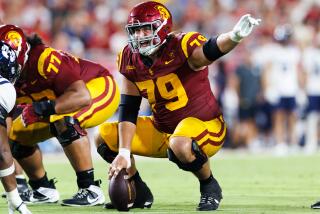Attorney Helps Troubled Trojans : Jurisprudence: Michael C. Carney says players don’t get favors that are unavailable to non-athletes at USC.
Michael C. Carney’s allegiance will be torn when USC plays Notre Dame on Nov. 26 at the Coliseum.
As a lifelong Irish fan, Carney usually roots for Notre Dame. But in the last four years, he has become a friend of Trojan football players who run afoul of the law.
Carney is the Los Angeles defense attorney USC football players have been turning to since he represented former Trojan Jason Oliver in a misdemeanor sexual battery case in 1991. Oliver and teammates Willie McGinest and Michael Jones were found not guilty by a Los Angeles Municipal Court jury.
Carney also represented receiver Keyshawn Johnson, whose theft case was dismissed in Van Nuys Municipal Court this week when prosecutors were unable to find the victim.
And the lawyer is representing cornerback Jessie Davis, who has a pretrial hearing scheduled in November involving charges of battery and hit-and-run with injury. Davis has pleaded not guilty.
Carney, chairman of the California State Advisory Committee to the U.S. Commission on Civil Rights, has represented other Trojan players whose criminal cases were dismissed. And he handled one player’s civil suit.
As a sports fan, he enjoys mingling with athletes and coaches such as Larry Smith and John Robinson.
But he said he is careful not to let his support affect his work. After the Oliver case, a Pacific 10 Conference official inquired as to how the players paid their legal fees. The inquiry involved questions of a possible violation of the NCAA’s extra-benefit rule, which states that athletes cannot receive favors by an institution employee or representative that are not available to all of the school’s students.
“I don’t treat these guys any differently than anybody else,” Carney said, adding that he has represented other USC students.
Carney said he is not associated with the school as a season-ticket holder or booster. His daughter attended USC for two years, and a high school friend, Xavier Suazo, a special agent with the California Department of Justice, worked game-day security for the Trojans for years.
Suazo contacted Carney in the spring of 1991 about representing Oliver. Carney said he agreed to take the case as long as Oliver could pay.
But when Oliver’s father died shortly after his mother’s death, Carney devised a payment plan to ease the pressure. He said he does that for clients who have financial hardships.
“These kids get a bill,” Carney said. “I tell them I realize they are not working. I have the understanding that when (they) can get a couple bucks, (they) pay me.”
Carney banks on the fact that when the players graduate, they will be gainfully employed.
“I’ve been stiffed for a lot of money over my 18 years in private practice,” he said. “I’m not in this as a charitable institution. It may sound like it ends up that way sometimes.”
Colleagues said Carney’s compassion for youth fuels his willingness to help. He has three sons, besides his daughter.
“I know he will go out on a limb to help somebody,” said Alex Kessel, who represented McGinest in the sexual battery trial.
Carney’s reputation at USC has spread since that case.
He was contacted to help UCLA’s Jamir Miller, the linebacker who was charged with receiving stolen goods. Miller eventually chose another attorney. Carney received another inquiry about a UCLA athlete but was too busy to handle it.
He said he represented a Cerritos College football player once, but would not identify him. He also has turned down a number of Trojan football players because their cases were either too far away or were so minor--traffic violations--that they didn’t warrant his time.
“For the most part the stuff has been nickel and dime,” he said of his USC cases. “(There have been) only three substantial items I’ve been involved in.”
A graduate of L.A.’s Loyola High, Carney attended Loyola University, then San Fernando College of Law.
He worked as a bailiff during law school, then joined the L.A. County District Attorney’s office once he passed the bar examination. He left the district attorney’s office in the mid-’70s and has worked privately since.
More to Read
Go beyond the scoreboard
Get the latest on L.A.'s teams in the daily Sports Report newsletter.
You may occasionally receive promotional content from the Los Angeles Times.






